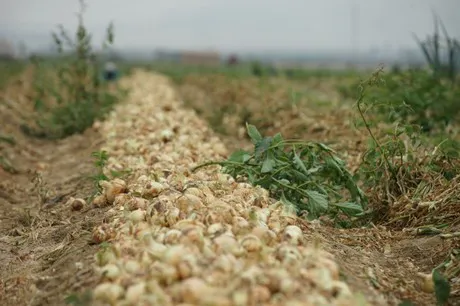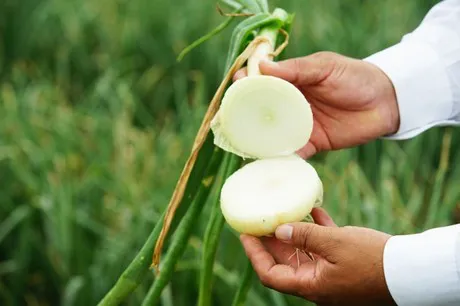Peruvian onions enter the market at the end of July and remain available until the end of January. The country’s varied geography makes the climate pretty diverse, allowing growers with land throughout the country to have long harvest seasons.
Roberto Monge Vargas, commercial director of KeyPeru says: “We begin harvesting our sweet yellow onions at the end of June in Ica, which is south of Lima, and in Olmos which is in the north of the country, about 300-400 kilometers below Ecuador. Then, at the end of November we begin harvesting north of Lima and in the central coastal areas. Because of the variety in the weather here, we are able to supply onions for six months of the year.”

The Peruvian harvests have suffered in the past two years because of El Niño, which made the yields very unpredictable and left the onions smaller than usual. About this year’s harvest, Roberto comments: “We have been having a colder and longer winter than usual this year, but this has been good for the onions. So far the volumes have been good and the onions are returning to their regular sizes. In general, this year has normal volumes and the crop has an average quality but we are regaining stability: our crop is recovering and returning to normal after the turbulence caused by the El Niño weather.

The United States is one of the main markets for Peruvian onions and the Peruvian crop usually arrives just as the U.S. finishes with their domestic crop. Roberto says: “KeyPeru works with suppliers in the U.S. and also directly supplies to retailers there. This year the transition between the domestic and the imported crops in the U.S. has been smooth and we are seeing good demand. This means that the markets in the U.S. are not yet fully saturated. This is one of our main markets, but it is also one of our main competitors. Their local production is in strong competition with us, so we have to wait for the local season to end before we can begin exporting our crop.”
The same situation happens with their export to Europe. Roberto explains: “We export to countries like the Netherlands and Spain in Europe and have a strategic agreement with a company specialized in onions and garlic. We are the supplier when the European countries aren’t producing their own product. This means we have to avoid arriving with our crop while their local production is still ongoing.”
Of future markets, Roberto says: We would like to expand our reach into Asia since we have a direct connection: the Pacific Ocean. Logistically, exporting to Asia would be very desirable for us.”

There is also demand closer to home, Robert claims, saying: “There are regional markets that are looking for onions in Chile, Colombia and Argentina, and there is some central American countries as well. These countries are looking towards Peru to supply them.”
The company also supplies onions domestically, working together with the major Peruvian supermarket chain Tottus, as well as supplying to some food service companies that process the onions into caramelized onions or pre-chopped packages.

The company is in the process of testing more than 30 different varieties of white, sweet yellow, red, and purple onions, working with seeds of different types to see what will grow best in their climate.
“The current varieties are showing lower yields than previous years. Right now, the crop still has good quality but we are working hard to ensure that in the future our company will continue to deliver quality crops. Along with food safety and social certifications like GlobalGap and SMETA, we focus on sustainability and have been certified with the Rainforest Alliance for over a decade. We don’t just grow onions, but we also focus on the social and environmental impact our company makes, and how we can continue to improve,” Roberto concludes.
For more information:
Roberto Monge V.
KeyPeru
Tel: +511-4477747
Email: roberto@keyperu.com
www.keyperu.com
